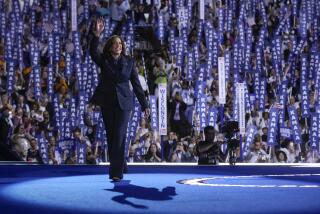Bush Borrows Widely to Make Point
WASHINGTON — Great orators coin famous phrases. President Bush, who has never claimed to be a great speaker, borrows.
And in the State of the Union address--by all accounts one of the most important speeches of his career--Bush and his speech writers borrowed widely.
First, he paraphrased one of the most famous lines from Barry Goldwater--”Mr. Conservative”--to rebut one of the favorite campaign themes of Bush’s conservative opponent, Patrick J. Buchanan.
Buchanan says that America should pull back from involvement in the outside world. As his key slogan he uses “America first,” the cry of the isolationists of the 1930s.
Bush’s rebuttal: “Strength in the pursuit of peace is no vice; isolationism in the pursuit of security is no virtue.”
Goldwater’s version--itself paraphrased from Revolutionary War pamphleteer Thomas Paine--got its debut at the 1964 Republican National Convention in San Francisco: “Extremism in the defense of liberty is no vice. And moderation in the pursuit of justice is no virtue.”
Next, Bush’s writers--Robert Grady, who wrote speeches for Bush during the 1988 campaign, Peggy Noonan, who wrote for former President Ronald Reagan, and Roger Ailes, who managed Bush’s campaign advertising--sought a way to connect with younger voters, a key voting bloc for the GOP.
The device they chose was a simple phrase--”this age of miracles and wonders”--drawn from one of Paul Simon’s largest-selling songs. Noonan had employed a similar device in Bush’s highly successful 1988 GOP convention speech--picking a line from a 1960s folk song to help Bush sound in touch with “Big Chill”-era voters.
Finally, Bush used a line from one of modern history’s best-known Democrats to challenge the Democrats in Congress.
“Members of Congress,” he said, “let me tell you what you can do for your country.”
The phrase recalled a memorable line from John F. Kennedy’s inaugural address: “Ask not what your country can do for you; ask what you can do for your country.”
More to Read
Get the L.A. Times Politics newsletter
Deeply reported insights into legislation, politics and policy from Sacramento, Washington and beyond. In your inbox three times per week.
You may occasionally receive promotional content from the Los Angeles Times.











